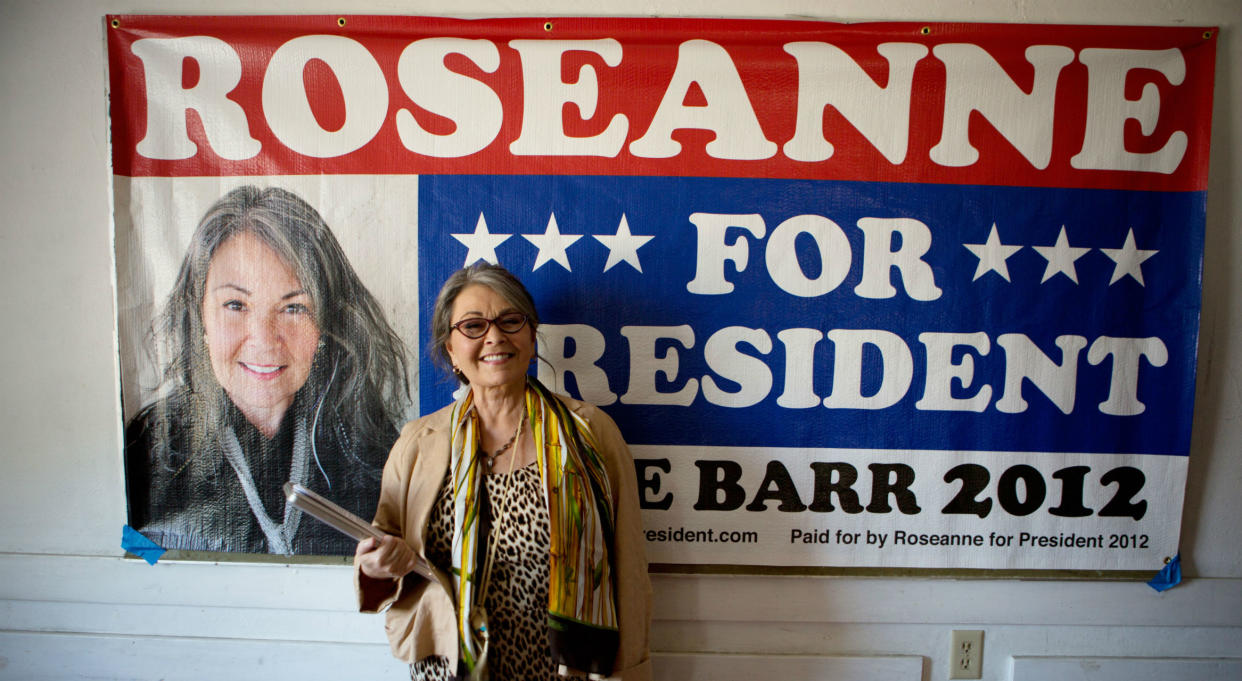Tribeca Film Review: ‘Roseanne for President!’

Commentators who wondered if Roseanne Barr’s 2012 presidential candidacy was a joke may still have their doubts after “Roseanne for President!” This authorized portrait doesn’t do much to suggest that the groundbreaking comedienne was a tireless contender for the Oval Office, although Barr does come across as a likable underdog who’s sincere in her desire to challenge big money and political entrenchment. A chronicle with some distance — perhaps one without Barr as executive producer — might have amounted to a deep-dish examination of what it takes to launch a third-party presidential candidacy.
As is, this puff piece of a documentary, directed by Michael Moore collaborator Eric Weinrib, is half campaign diary and half career appreciation — an irreverent, personal look behind the curtain a la “Joan Rivers: A Piece of Work.” It will likely stoke curiosity among those who followed (or weren’t aware of) Barr’s candidacy, but its flippant approach makes it more of a specialty item for fans than a heavyweight issue doc.
According to materials provided, Barr initiated the film and selected Weinrib to document her quest, which began with a bid for the Green Party nomination. Her supporters included Cynthia McKinney, the Greens’ candidate in 2008, who notes the benefit that Barr’s following might bring to the party. Barr’s platform seems to be a mix of progressive advocacy (support for single-payer universal healthcare) and possibly sarcastic bomb throwing (she tamps down her talk of giving the guillotine to immoral bankers). Both in forums and in private, much of what she says sounds more like standup material than stump speeches. At one point, extolling the virtues of marijuana, she tells us that the president ought to keep a joint by the nuclear button.
We often see her at home in Hawaii, with her boyfriend, John Argent. She Skypes in for state-by-state Green Party conventions — flying, she says, is “not the Green way” — although the eventual nominee, Jill Stein, tends to be there in person. The clear frontrunner, Stein is portrayed, in this context, as a high-handed embodiment of the establishment. Still, Barr maintains a persistent optimism: In one of the funnier bits, subtitles fact-check her as she rattles off states she regards as success stories.
The film traces the campaign’s roots to Barr’s activism on television, where “Roseanne” is still regarded as having broken ground in its portrayal of working families and gay characters. Rosie O’Donnell, Tom Smothers and Sandra Bernhard hold her up as an essential comic voice, while Barr’s family members provide earnest biographical testimonials, including remembrances of how she changed after being hit by a car and suffering head trauma. These testimonials are amply supplemented with clips from the show and old comedy acts. Barr’s off-key rendition of the National Anthem at a ballgame in 1990 — ridiculed by, among others, then-President George H.W. Bush — is the moment the movie seems to choose as her career low point.
Somewhat more novel and compelling is the time we spend with Barr’s Minnesota-based campaign manager, Farheen Hakeem, who chats on the phone while driving through blinding snow and at times seems to be singlehandedly running the campaign, even assembling a parade trailer on her own. Her ground-level activism could easily be the subject of a separate, less self-promoting film.
Barr ultimately ran on the Peace and Freedom ticket in California, Colorado and Florida. In one of the most surprising scenes, she and Argent read up on the returns at home, as if nothing out of the ordinary is happening; the scene is in keeping with the movie’s coyness about whether the candidacy is genuine or just a lark. “Let’s get some pizza and buy some wine,” Argent concludes.
Tech credits, mirroring the campaign apparatus, are rudimentary.
Get more from Variety and Variety411: Follow us on Twitter, Facebook, Newsletter
